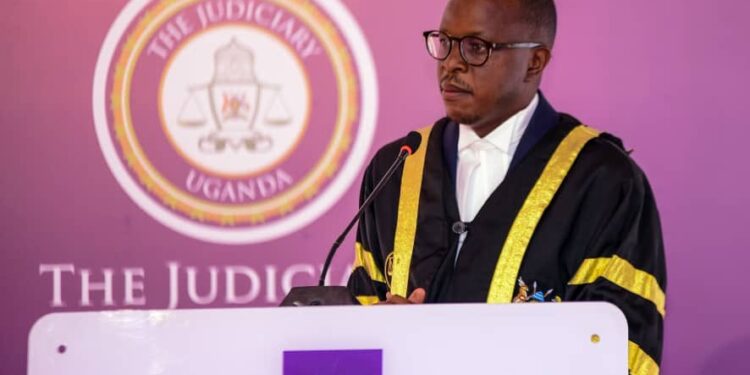In a resounding call for transparency and accountability, the Uganda Law Society has rallied for a reform in the process of appointing judges, asserting that it should be an open and scrutinized affair.
The society, entrusted with upholding professionalism within Uganda’s legal community, has decried the current system as shrouded in opacity.
During the 6th Chief Justice Benedicto Kiwanuka memorial lecture held in Kampala, the Association’s President, Bernard Oundo, emphasized the pivotal need for a merit-based selection process.
He argued that a transparent appointment system is crucial to ensure the judiciary’s accountability to the public. Oundo warned of a potential perpetuation of an acting Judiciary should the status quo persist.
This call for reform was echoed in a landmark ruling by the Constitutional Court in December, which declared the appointment of judges in an acting capacity as a violation of the 1995 Constitution. The court, in a majority ruling of 4:1, mandated the Judicial Service Commission to regularize the appointments of 16 High Court judges appointed under this contentious practice.
Dr. Busingye Kabumba, a Makerere University lecturer, and human rights activist Andrew Karamagi spearheaded this legal challenge, contending that acting appointments compromised the security of tenure for judicial officers, thereby undermining the constitutional framework.
Beyond the issue of acting appointments, a broader demand for public vetting of judges has emerged. Politicians and legal experts alike have advocated for a streamlined, merit-based selection process, one that brings deserving judicial officers to the forefront. Oundo proposed the advertising of vacant positions and the public release of shortlisted candidates to achieve this end.
The current Chief Justice, Alfonse Owiny-Dollo, in response to the flagrant violation of court orders by state agencies, condemned the actions as not only illegal but also sacrilegious. He implored citizens to foster peaceful dialogue, recounting his own efforts in seeking resolution with figures like Joseph Kony.
Reflecting on Kiwanuka’s enduring influence, President Yoweri Kaguta Museveni acknowledged the vital role he played in Uganda’s history. Museveni emphasized the importance of a disciplined political opposition in a thriving democracy.
Retired Supreme Court Justice Jotham Tumwesigye underscored the judiciary’s pivotal role in providing stability and fostering national growth. He emphasized the need for the judiciary to maintain its independence, guarding against any undue influence.
The lecture, a gathering of distinguished judicial officers and dignitaries, served as a platform to amplify the call for a transparent, accountable, and unbiased judiciary.
Deputy Chief Justice Richard Buteera, Principal Judge Dr. Flavian Zeija, Chief Registrar Sarah Langa Siu, and Deputy Attorney General Kafuuzi, along with representatives from foreign governments, all lent their voices to this crucial conversation. The resounding message: a transparent judiciary is the linchpin to a just and flourishing society.
Do you have a story in your community or an opinion to share with us: Email us at editorial@watchdoguganda.com










